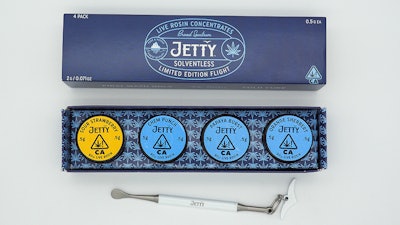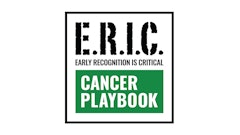
Editor’s note: Jetty Extracts co-founder and CEO Ron Gershoni will speak at Cannabis Conference on the session: “Your Extraction Game Plan: A Guide To Winning The Long Game,” which will run from 11 a.m. to 12 p.m. on Thursday, Aug. 17. In this session, attendees will gain an understanding of different extract products on the market and methods used to create them; learn how to evaluate product demand, price points, trends and opportunities in your market; understand your goals and whether it makes business/financial sense for you to build your own lab; how to use a data-driven approach and market analysis to determine the business case for which products you will create and what equipment you will need; and more. Visit www.CannabisConference.com for more information and to register.
After spending a decade sculpting its business in California, cannabis extract and vape producer Jetty Extracts has expanded to two markets this year, first to New York and, last week, to Colorado.
Here, co-founder and CEO Ron Gershoni shares why these markets are appealing for Jetty, what makes a good business partner for this kind of expansion, how consumer trends compare across the markets, and more.
Melissa Schiller: Why is Colorado an attractive market for Jetty Extracts?

Ron Gershoni: This is our tenth year of operation. We started in San Diego in 2013. [Our headquarters has] been in Oakland since 2015, and we’ve had a lot of opportunities to look at other markets for expansion over the decade we’ve been in business in California, but we’ve never ventured out of California until just the last quarter, [when] we chose to go to New York. We didn’t want to lose focus on California, which is a very large market and is a very competitive market. It’s a super innovative market. We have seen other companies that have tried to expand quickly for a variety of reasons, but it’s very expensive and running a high-quality product business takes a lot of bandwidth, from leadership [and] from our chemists. So, we really wanted to wait until we were ready, and we now feel like we are ready.
Each of the decisions to go to new markets are very deliberate, and we put a lot of time into figuring out which markets to go to. I think there are now [close to] two dozen adult-use markets in the United States. There are also international markets. So, there are a lot of different options. I think there are pros and cons when we look at all these markets.
Colorado was really interesting to us. I lived there for a couple years, so I know Colorado well. It’s also the first market in the United States that went adult use, and it’s therefore one of the most mature markets. It’s got a very sophisticated consumer base and [the consumers are] knowledgeable, which we feel plays very well to our focus on solventless extraction and solventless products.
The other really, really big factor is we have a longstanding relationship with Leiffa, and they are also experts in solventless extraction. The market is attractive, but the partner was a huge part of it. Brandon [Epley], who is the CEO and founder of Leiffa, actually owned a dispensary in San Diego with my co-founder, Nate Ferguson, about 15 years ago. We’ve been friends [for] a long time. We’ve been in business together in former lives. There’s just a high level of trust. We know that they’re going to be a great partner.
Those are the main reasons why we chose now to go to Colorado, which I’m aware is a market that a lot of companies are afraid of or are actually exiting because, as a total market, it’s actually declining, and it’s got a lot of dynamics that make it difficult to operate in.
MS: What other factors made Leiffa a good partner to execute Jetty’s expansion into Colorado’s market? Do you have any advice for vetting partners for this type of expansion?
RG: It’s really hard. I think that talking to everyone is important. And at the end of the day, business comes down to people, so finding people that you share common values and market understanding with is really, really important because no partnership goes perfectly. I think the last thing you want to be doing is trying to fill out a legal document and pointing out flaws. It’s got to be someone that you’re going to get on the phone with and work through problems. Really, [it’s] just getting comfortable with the leadership team, knowing that you can work together to solve problems. We have a lot of business partners, and nothing ever goes perfectly. It’s just a mutual understanding that that is the reality and that you’re going to have to work together and be nimble.
If you have a preexisting relationship like we did with Leiffa, that is the best way. But I also think [it’s about] crawling before you can walk or walking before you can run. Try to develop some sort of business relationship so you can figure out how to work together before maybe going really, really big together—if there’s a way to do that, that’s helpful.
MS: Why was New York appealing to the company as its first target market for expansion?
RG: I grew up in New Jersey and I lived in New York City for a decade. My two co-founders, Nate Ferguson, who I mentioned, and his brother, Rob, are both from Buffalo. Nate also lived in New York City for a number of years. We know the geography. We spent most of our lives there before finding California, so it’s a homecoming of sorts for us. We know a lot of people there. We’ve been tied into the scene there. There was sort of a comfort from that side of things.
It's also a brand-new adult-use market that is projected to be one of the biggest markets in the country within about five years. What we’ve heard from others who have expanded out of state is that the most important or best ways to get into new markets are obviously with the right partner, but also if you get in early, there’s a huge advantage. So, we also wanted to focus on New York. We got there early. We were one of the first California brands to launch our products in New York State. The rollout’s been incredibly slow, which is a separate matter, but we remain really, really optimistic that it’s going to be a big market. People in New York love weed. I saw it when I lived there. We still see it now. It’s a cultural epicenter for pretty much everything, but weed is one of those things.
RELATED: ‘The Lost Year’: New York’s Adult-Use Cannabis Industry Grapples With Sluggish Rollout
We’ve always wanted to build a brand that is respected for the craft and the quality, and when you look at almost any brands, being successful in California and New York, in our opinion, are the most important places to be. There are a number of factors that led us to New York, but we’re spending a lot of time there and putting a very large amount of our resources behind getting new products into that market, hiring up our team, and we’re pretty excited.
MS: What kind of sales trends are Jetty seeing in Colorado and New York? How do the two markets compare in terms of consumer behavior?
RG: It’s really early. I think I’ll probably have better answers to those questions by the end of the year. We launched in Colorado this week, so I don’t have much from our own sales, but we were in already more stores in Colorado than in New York in one week versus two months. That’s based on just there being so many more stores [in Colorado]. Colorado is a much, much bigger market. There are far, far more retailers.
We did notice when looking at trends through BDSA and Headset that solventless rosin vape products, especially one-gram products, are very new but are doing very well in Colorado, and that’s our main product that we sell here in California. We continue to win awards for that product line, so we’ve taken the same tech and IP that we use to make these great products in California, which has made us the No. 1 solventless vape brand in California, to Colorado. Colorado is kind of a first-mover market and was very big in moving toward different types of high-end butane extracts. We see it also being on the front edge of moving toward solventless products, which is really attractive to us.
New York is brand new. There are only a dozen stores. I think it’s very hard to gauge any sort of trends. We do look at what’s going on in the black market, both in California and New York, as those trends do seem to lead the trends in the licensed market. As has been widely reported, there are well over 1,000 unlicensed stores in New York City alone.
MS: What are some of Jetty’s broader goals for the second half of 2023?
RG: As I mentioned earlier, staying focused is something we’ve always been good at. California is a market that is struggling in a lot of ways—it’s been widely reported the challenges with distribution, but it really runs throughout the entire supply chain. We’re continuing to grow in California—we’re up year-over-year—but we feel like the path for us to success here is increasing our points of distribution and continuing to launch some new products. We have a solventless edible that’s going to be coming out in August; that’s going to be a huge thing we’re focused on for the remainder of the year in California.
Then, [it’s] just establishing ourselves in New York and Colorado. It’s a big undertaking, and a strong start is really a good way to ensure long-term success. Our entire team is spending a lot of time visiting those markets and communicating with our partners to make sure that we’re supporting the retailers, that we’re doing things that are interesting to consumers, and that our product quality is on point.
Then, we will be entering New Jersey. As I mentioned, that’s where I grew up. We think we can manage a sales and marketing team in the tri-state area between New York and New Jersey. Geographically, having the presence of two markets right there is something that makes sense for us. Just like New York, [New Jersey is] also a market that we know well and have connections in. We expect, probably by Q4, having products on the shelves in New Jersey.
What we’re hearing and what we’re seeing with public market companies and private companies [is] that the U.S. cannabis market is under a lot of pressure, and there are many, many companies that are struggling. It’s a really tough industry in which to operate. I think there’s still growth. People are still consuming cannabis. There are still going to be opportunities for new companies, for entrepreneurs, to get involved. But there’s still a long way to go, I think, from a regulatory standpoint. There’s still very little progress at the federal level, which is disappointing. We’ve been in this for 10 years and that feels like an eternity, but it’s still early days for the overall market. There’s still a lot of options for how things could shake out.
We always felt [that if you can survive in California, you can survive anywhere], and [that’s] why we also didn’t rush out of California. I do think—and I hear this from a lot of other business owners I know—that other markets are starting to look more like California with more competition, more price compression. I think that we have learned in the hardest market. You can’t win in California without running a solid business and without having a great product, and I think those learnings have positioned us really well for success as we expand nationwide.
Editor’s note: This interview was edited for style, length and clarity.
Join us this year at the Paris Las Vegas Hotel & Casino for Cannabis Conference, the leading education and expo event for plant-touching businesses.


























